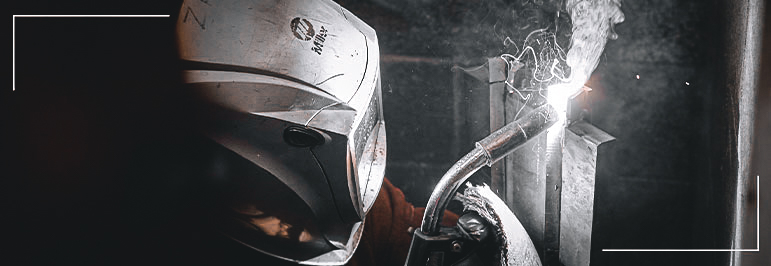Welding and Fabricating Technology

Welding and Fabricating Technology - AAS
Any industry that creates goods and structures from metal will rely on skilled welders to create strong products, whether in aerospace, automotive, or construction fields. Turning ideas and materials into valuable products takes highly skilled employees who are trained in such specialized areas as welding technology. BTC’s degrees and certificates in the Welding Technology Program are ideal for students with mechanical aptitude or a strong foundation in math, science, and technology.
Prepare for your welding career through BTC’s Welding Technology Program. You will get premier job training for skills in high demand by the metal and construction trades for work as a welder, cutter, or welding machine operator. Students choose to specialize in one of two areas: structural steel fabrication or pipe welding.
In our state-of-the-art welding and fabrication facility, you’ll learn valuable skills that high-wage employers are looking for. From safety practices and blueprint reading to technical skills like metallurgy, MIG, and TIG welding, BTC’s hands-on job training will prepare you for a career in boat manufacturing, steel manufacturing, refining, and transportation, or with federal, state, or local governments.
Student Chapter of the American Welding Society (AWS)
Employment Information
Data are provided on a program (not credential) level
83% BTC graduate placement rate1
$60,324 starting annual wage2
$75,473 average annual wage2
$96,763 potential annual wage2
Entry Information
When Can I Start?
This program typically starts in Fall Quarter.
What are the Minimum Entry Requirements?
A completed college admissions application and placement in English and math. BTC uses a Guided Self-Placement process to help you choose the best starting point for your English and math courses. Your selections will determine whether you begin with program coursework or complete prerequisites classes first.
To get started or for help determining your English and math placement, contact the Outreach department at Outreach@btc.edu.
Early Program Course Requirements
It is highly recommended that students take these courses prior to program entry:
- CMST& 210 Interpersonal Communications
- AENGL 100 Applied English
- AMATH 100 Applied Occupational Math
What are My Next Steps?
Classes
Total Program Credits: 98
General Education Core Courses
AENGL 100 Applied English 5 CR AMATH 100 Applied Occupational Math 5 CR CMST& 210 Interpersonal Communications 5 CR
TOTAL General Education Course Credits15 CR Program Core
WLD 101 Welding Safety 2 CR WLD 105 Thermal Cutting Processes 4 CR WLD 106 Print Reading I 2 CR WLD 110 SMAW I 4 CR WLD 116 SMAW Practice 2 CR WLD 120 GMAW I 4 CR WLD 121 GMAW Aluminum I 4 CR WLD 130 FCAW I 4 CR WLD 131 FCAW Practice 2 CR WLD 140 GTAW I 4 CR WLD 141 GTAW Aluminum I 4 CR WLD 150 Introduction to Metal Fabricating 4 CR
TOTAL Core Course Credits40 CR Program Specialty
WLD 206 Print Reading II - Welding & Fabrication 3 CR WLD 213 Print Reading III 3 CR WLD 220 SMAW Test Practice II 4 CR WLD 232 FCAW Practices II 4 CR WLD 242 GTAW & GMAW Alloy 6 CR WLD 252 Alloy Fabrication 6 CR WLD 254 Steel Fabrication 5 CR WLD 271 Welder Testing 6 CR
TOTAL Specialty Course Credits37 CR Electives
WLD 291 Capstone Project I 3 CR WLD 292 Capstone Project II 3 CR WLD 293 Welding Internship I 3 CR WLD 294 Welding Internship II 6 CR
TOTAL Elective Course Credits6 CR
Program Outcomes
After successfully completing the AAS degree, students will be able to:
- Exhibit & maintain essential employability behaviors.
- Observe and practice industry safety guidelines.
- Analyze and interpret prints, drawings, and symbols for welding and fabrication of parts and structures.
- Achieve competency in a variety of major manual and semi-automatic welding processes in all positions.
- Demonstrate proper set-up and use of welding and fabricating equipment.
- Troubleshoot and solve basic welding, fabricating and equipment problems.
- Pass at least one WABO certification or industry-accepted certification welding test (ASME, AWS, ABS, etc.).
- Exhibit knowledge of occupational environments, metallurgy, materials, tools, fabrication, layout, and mechanical and thermal cutting processes and techniques.
- Demonstrate appropriate oral and written communication with customers, co-workers, and supervisors.
- Analyze and interpret prints and drawings for welding and fabricating.
- Employ efficient organizational skills.
- Stay current with new and emerging technologies.
Employment Outlook
Employment opportunities for welders are expected to increase. Employment opportunities for welders, cutters, and welding machine operators differ by occupational specialty. But up-to-date job training will lead to good employment opportunities, according to the U.S. Bureau of Labor Statistics.
While at BTC, you can be active in the Student Chapter of the American Welding Society (AWS) to begin networking and interacting with professionals in the welding and fabricating fields.
Criminal convictions may restrict or prevent student participation with internships and employment in this industry.
Welders are employed in various areas of business and industry that require working with different types of metal for either manufacturing, repair, or cutting. Nationally, nine out of ten welders and cutters are employed in manufacturing, services, construction, or wholesale trade.
Typical places of employment include sheet metal fabrication companies, energy service companies, steel manufacturing companies, refineries, fence and iron companies, transportation, heating and plumbing companies, various unions, federal, state and municipal government, and self-employment. Potential positions include welder, cutter, welding machine tender, welding machine operator, foreman, and leadman.
Faculty & Support

Russell Jones
Welding Technology
Kyle Miller
Welding Technology
Coly Rush
Welding Technology
Rachael Apt
Welding Technology
Sam Schmidt
Welding TechnologyContacts
If you have questions about this program or want help with the admissions steps to Bellingham Technical College, please email outreach@btc.edu.
Current students wanting academic planning and support, can connect with the program Instructor(s) or email AdvancedManufacturingNav@btc.edu
